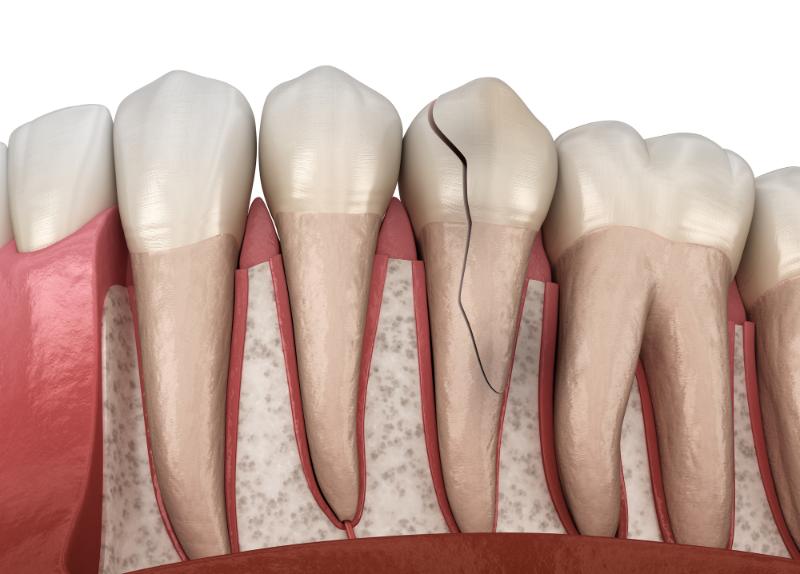A cracked tooth can be a concerning issue. Many wonder, “Can a cracked tooth heal on its own?” While it might be tempting to wait and see, dental professionals agree that a cracked tooth generally cannot repair itself due to the structure of the enamel and dentin. Here’s a look at why cracked teeth need attention, what symptoms to watch for, and the most effective treatments available.
Understanding Cracked Teeth and Their Causes
Cracks in teeth are more common than many realize, affecting people of all ages. A cracked tooth occurs when there’s a fracture in the structure, often due to the following factors:
- Injury or Trauma: Impact from sports or accidents can easily cause teeth to crack.
- Misaligned Bite: An uneven bite exerts excessive pressure on specific teeth, which can lead to cracks.
- Bruxism: Persistent grinding or clenching can weaken teeth over time, making them prone to fractures.
- Temperature Sensitivity: Exposure to hot and cold foods, especially in rapid succession, may cause small cracks in the enamel.
- Age-Related Wear: Teeth naturally weaken over time, making them more susceptible to cracks as a person ages.
Symptoms of a Cracked Tooth
While some cracked teeth are obvious, others can be more challenging to detect. Here are a few signs that may suggest a tooth has a fracture:
- Sensitivity: Sharp sensitivity to hot, cold, or sweet foods is a common indicator.
- Pain While Chewing: Discomfort or a sudden, sharp pain when biting down may suggest a crack.
- Gum Swelling: Swelling around the affected tooth can indicate that bacteria enter the tooth structure through a crack, leading to inflammation.
- Persistent Pain: Continuous throbbing or aching in the tooth might signal a deeper crack or damage to the pulp.
Why a Cracked Tooth Cannot Heal on Its Own
Unlike bones, teeth lack the blood supply necessary for self-healing. Enamel, the hard outer layer of the tooth, is primarily composed of minerals without blood vessels, so the body cannot repair cracks once they form. Even superficial damage may worsen if left untreated, potentially spreading to the tooth’s deeper layers. While minor cracks might undergo some remineralization, these changes are generally superficial and do not fix fractures.
Risks of Leaving a Cracked Tooth Untreated
Ignoring a cracked tooth often leads to more serious issues over time, including:
- Infection: Bacteria can easily enter through cracks and infect the pulp, leading to abscesses and severe pain.
- Tooth Loss: A crack that extends deep into the tooth or root may render the tooth unsalvageable, necessitating extraction.
Treatment Options for Cracked Teeth
Fortunately, dental advancements have led to a variety of effective treatment options for cracked teeth, tailored to the severity and location of the crack:
- Bonding: For minor surface cracks, dentists may use bonding, where composite resin fills the crack and restores strength and appearance. This is a common option in general dentistry for smaller fractures.
- Crowns: For more severe cracks, crowns cover the entire visible portion of the tooth, protecting it from further damage. Crowns are durable, often providing a long-lasting solution while preserving as much of the natural tooth as possible.
- Root Canal Therapy: If a crack has extended into the tooth pulp, a root canal may be necessary to remove damaged or infected tissue. Afterwards, a crown is usually placed to restore the tooth’s structure and function.
- Extraction: In cases where a crack is too severe for repair, extraction may be the only option. This is often followed by a dental implant to fill the gap left by the extracted tooth, restoring the smile.
Long-Term Care for a Healthy Smile
Preventing cracked teeth from worsening involves practical steps, such as wearing a mouthguard during physical activities, addressing bruxism with a nightguard, and maintaining regular checkups. Regular visits to a professional in general dentistry can also help catch issues early, reducing the risk of complications.
Transform Your Smile with Expert Care
Addressing cracked teeth and other dental concerns promptly is crucial for a healthy smile. At Dr. Alex Rubinov’s dental practice in New York City, we provide comprehensive treatment plans tailored to each patient’s needs. From minor surface cracks to complex cases requiring advanced procedures, our services include bonding, crowns, root canal therapy, and dental implants.
With a focus on precision, comfort, and patient-centric care, our team ensures you receive exceptional treatment to restore both function and aesthetics. Choose our practice to benefit from Dr. Rubinov’s expertise and compassionate approach. Start your journey to optimal oral health and renewed confidence by scheduling a consultation today. Visit our Midtown Manhattan office at 45 Rockefeller Plaza, Suite 1807, or Contact us to book your appointment. Your smile deserves the best care – let us help you achieve it!


